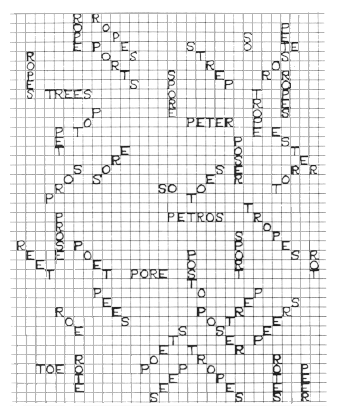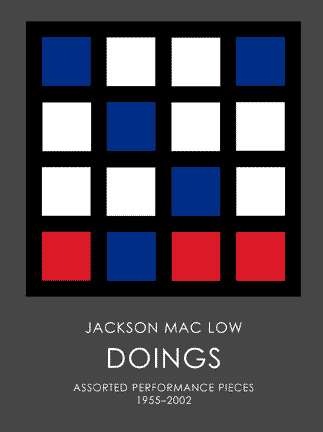A Vocabulary Gatha for Peter Rose
I once took a job with a weekly newspaper in San Francisco just to get my hands on their review copy of Jackson Mac Low’s Stanzas for Iris Lezak. Jackson’s first big book & the first great work of procedural poetry to be published in
Now Granary Books has published Doings, offering us yet another major Jackson Mac Low. It is one of the most ephemeral, yet most important, of all his facets, that of performance artist. Arranged chronologically, from the 1955 “21.21.29., the 5th biblical poem (for 3 simultaneous voices) the first biblical play” to the 2002 “Gatha in C for Theresa Salomon,” Doings chronicles the progress of Mac Low’s work for live & recorded performance. At 266 7.5” by 10.5” pages, it’s a production on the scale of a largish art book & the nature of many of these scores – there are five gate-fold pull-outs, for example – makes it every bit as complicated a project. In addition, there is a 60-minute CD (or CD/MP3 is more like it) that offers recordings of 15 pieces, ranging from the vocal performances to Theresa Salomon’s exquisite violin realization of that last project. If this publication has any limitation, it is only that the press run is just 1,000 copies. That has implications not only for the price – it’s a $50 paperback, tho cheap for the value – but for the distribution also. A lot more than 1,000 readers are going to want this book – indeed, a lot more than 1,000 poets are going to need this book. Within six months, any poetry library that doesn’t have this book can be dismissed as not serious.
One aspect I find fascinating, reading through – and like an art book, this isn’t so much a volume one reads as it is one “reads in” – Doings, listening to the CD, is that performance represents the most joyous side of Mac Low’s work – Doings is a bright, sunny, optimistic volume, not something one always gets in reading Mac Low’s more text-centric works, which could brood on the fate of the planet. It’s as if the insertion of voice – or is it sound, as such? – causes the work itself to connect with what Yoda would call the life force implicit whenever air vibrates, on a string or in the hollows of a flute, or within the human throat.
Mac Low, of course, has his influences & they range from his classical music training as a boy in
Mac Low worked on this project before he died, seeing & approving every step right through the final proofs. Like many others, I felt devastated when he passed on December 8 last year. This book is so completely like having him back in the room again that it’s spooky. And that really is the magic of Doings.







